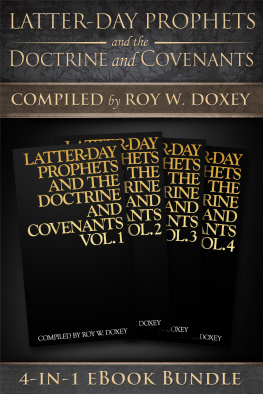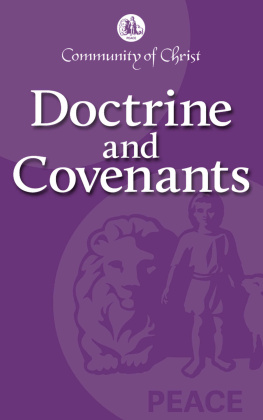For Pat
Who knows His name
and knows Him
Wherefore God also hath highly exalted him, and given him a name which is above every name: thAt at the name of Jesus every knee should bow... and... every tongue should confess that
Jesus Christ is Lord
Philippians 2:911
No Sweeter Sound than
Thy Blessed Name
T his year marks my twenty-fifth year as a member of the Quorum of the Twelve Apostles of The Church of Jesus Christ of Latter-day Saints. Through the very challenging nights and wonderfully rewarding days of that calling, I have tried to feel equal to the responsibilities inherent in such a sacred office. At the same time, I have tried not to feel overwhelmed by the sense of inadequacy that never seems to abate. After two and a half decades, I havent made much progress toward either goal. My apostolic calling is still the same unspeakable privilege and humbling obligation I felt it to be on the twenty-third of June, 1994.
With a great desire to be honorable from the first day on, I threw myself into reading all I could about the holy apostleship. I read in the scriptures, I read biblical essays and commentaries, and I read the sermons of those who have so served. Amidst all else I was coming to know early in my study, I learned that among the most important responsibilities I had was to be one of the special witnesses of the name of Christ in all the world[and]... to officiate in the name of the Lord,... agreeable to the institution of heaven (Doctrine and Covenants 107:23, 33). There was more:
Behold, Jesus Christ is the name which is given of the Father, and there is none other name given whereby man can be saved;
Wherefore, all men must take upon them the name which is given of the Father, for in that name shall they be called at the last day;
Wherefore, if they know not the name by which they are called, they cannot have place in the kingdom of my Father.
And now, behold, there are others who are called to declare my gospel, both unto Gentile and unto Jew;
Yea, even twelve; and the Twelve shall be my disciples, and they shall take upon them my name; and the Twelve are they who shall desire to take upon them my name with full purpose of heart.
And if they desire to take upon them my name with full purpose of heart, they are called to go into all the world to preach my gospel unto every creature (Doctrine and Covenants 18:2328; emphasis added).
I didnt grasp all that that meant, but it was obvious the name of Christ was central to these scriptural mandates and it would require full purpose of heart to fulfill them successfully.
All of this carried with it an echo from my youth, when I first became aware that so many things (all covenantal things) done in the Church were done in the name of Deity.
I remembered from my own baptism as well as those I performed as a missionary that this sacred ordinance was to be performed in the name of the Father, and of the Son, and of the Holy Ghost (Doctrine and Covenants 20:73).
I remembered that taking the sacrament of the Lords Supper, or passing it, or blessing it, involved a prayer in which we asked God in the name of [the] Son for blessings that could come only to those who were willing to take upon them the name of thy Son (Doctrine and Covenants 20:77).
Every other ordinance I had experienced in my youth, including my patriarchal blessing, my ordination to various priesthood offices, assorted blessings and settings apart, and the majesty of the entire temple experience were all administered either in the name of Jesus Christ or in the name of the Father, and of the Son, and of the Holy Ghost.
That history coupled with this new calling led to a habit in my daily scripture study of jotting down or otherwise noting the references to Jesuss various names that I found in the standard works.
As my study continued rather casually over the years, I was greatly blessed when my apostolic brother, Elder Dallin Oaksthen of the Quorum of the Twelve Apostles, now of the First Presidencypublished a mind-expanding and Apostle-educating little book entitled His Holy Name. It remains the definitive work on the many uses to which the name of Christ can be put, suggesting the doctrine and significance of names generally and the name of Christ specifically. He reflected on the wide variety of purposeswell beyond simple identificationfor which the name of Christ can be invoked. Because these purposes provide a valuable backdrop to the work I have done, I share the essence of them here.
Name as Authority or Pr iesthood or Power
Example: Peter and John invoked the name of Jesus in healing the lame man at the temple in Jerusalem. In that encounter, Peter said, In the name of Jesus Christ of Nazareth rise up and walk (Acts 3:6; emphasis added). When the man was instantly healed, Peter explained to the stunned onlookers: And his name through faith in his name hath made this man strong (Acts 3:16; emphasis added). (Joseph Smiths inspired translation of the Bible makes this verse clearer and easier to understand: And this man, through faith in his name, hath been made strong.) Later, when Peter and John were arrested, their captors asked, By what power, or by what name, have ye done this? Peter replied, By the name of Jesus Christ of Nazareth (Acts 4:7, 10; emphasis added).
Name as Work or Plan
Example: The work of the Atonement is characterized as being inextricably linked with Christs name: And behold, it is he that cometh to take away the sins of the world, yea, the sins of every man who steadfastly believeth on his name (Alma 5:48; emphasis added). Again, And he shall come into the world to redeem his people; and he shall take upon him the transgressions of those who believe on his name; and these are they that shall have eternal life, and salvation cometh to none else (Alma 11:40; emphasis added). This redemptive plan, carried forward in Christs name, leads directly to the temple: Verily I say unto you, it is expedient in me that the first elders of my church should receive their endowment from on high in my house, which I have commanded to be built unto my name in the land of Kirtland (Doctrine and Covenants 105:33; emphasis added).
Name as Essence or Exaltation
Example: In response to God instructing Moses to lead the children of Israel out of Egypt, Moses replied, Behold, when I come unto the children of Israel, and shall say unto them, The God of your fathers hath sent me unto you; and they shall say to me, What is his name? what shall I say unto them? And God said unto Moses, I AM THAT I AM: and he said, Thus shalt thou say unto the children of Israel, I AM hath sent me unto you (Exodus 3:1314). When Moses was asking to know the name of God, or at least how to identify Him to Pharaoh, he was asking to know the essence or the nature of God. The answer he got was in the first-person present tense of the verb to be. The answer was given in terms of Gods ever-present essence.

















